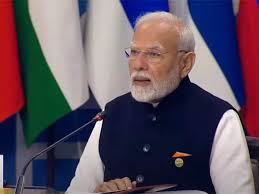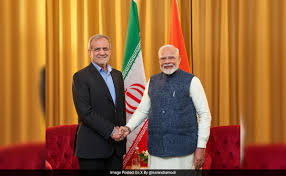
Relations between India and Russia were up-graded from “strategic partnership” to “special and privileged strategic partnership” in 2010. Five years after this up-gradation and two years after the assumption of power by Prime Minister Modi, it would be appropriate to enquire whether the inherent potential of the bilateral partnership has been realized.
Historical Context
Strong relations with Russia are a key pillar of India’s foreign policy. Russia is a longstanding, time-tested, partner. Be it in the field of equipping our defence forces or industrialisation of the country or strategic support in the UN Security Council, Russia has always come to India’s help. Relations between India and Russia have been based on defence acquisition, hydrocarbons, nuclear energy, space cooperation, trade and commerce, science and technology, culture and people to people ties.
Current Problems
Some major issues of dissonance have appeared between the two countries over the last few years. The first concerns the rapidly expanding ties between India and USA, which started with the India-US nuclear deal in 2008. The second concerns the growing defence relationship between India and USA. India has so far been heavily dependent on Russian armaments with more than 70 per cent of its weapons being sourced from Russia. Although in absolute terms Russia is still the largest supplier of defence equipment to India, its share in overall imports has progressively declined. Most recently, India’s reported decision to sign the three ”foundational” defence Agreements with USA, viz., Logistics Support Agreement (LSA), Communications Interoperability and Security Memorandum of Agreement (CISMOA) and Basic Exchange and Cooperation Agreement (BECA) for Geo-spatial Cooperation, has surfaced as a cause of serious concern for Russia. The latter feels that India is virtually entering into a military alliance with USA, which will severely restrict Russia’s ability to share sophisticated defence technology with it.
The frequency and comfort level in meetings between Modi and Obama are perceived to be higher than with Putin. Modi will travel to USA next month, his fourth visit in two years. Obama created history by visiting India twice in his term, as also to become the first US President to attend India’s Republic Day celebrations as Chief Guest in January 2015. In addition, Modi and Obama have interacted closely in several international fora like East Asia Summit, G-20 Summit, COP21, and others. As against this, meetings between Modi and Putin have been more formal and limited to two annual Summits and BRICS Summits.
Opportunities
Modi and Putin need to give much greater personal attention to building and strengthening the India-Russia partnership. This task cannot be delegated to Foreign Ministers or Foreign Offices. Prime Ministers from Nehru to Vajpayee have been the driving force behind the successful engagement with Russia. In the current scenario also, it would devolve upon Modi to take charge of bilateral ties with Russia, as he has done with several other significant partners.
The significance of defence exports for Russia has grown considerably over the last few years, as the prices of oil and gas, on which it is heavily dependent, have declined precipitously. India should quickly conclude some visible, high-ticket, defence deals with Russia. The import and progressive manufacture in India of KAMOV-226 helicopters, which was discussed during Modi’s visit in December 2015 can be a game changer. Some other pending deals on which decision has been unduly delayed because of the reported obduracy of the Ministry of Defence should be concluded expeditiously.
Modi and Putin need to have a frank conversation about India’s growing relations with USA. Modi should make Putin appreciate that India’s expanding ties with USA are neither at the expense of Russia nor are they in any way directed against Russia or detrimental to its interests. Strategically they are designed to provide greater political space as well as manoeuvrability for healthy relations with China. India and China have differences in several areas and China’s assertive attitude has caused increasing concern to India. On issues of strategic interest to Russia like Ukraine, Crimea, Syria, Georgia, etc., India has always expressed understanding of Russian position. Modi also needs to sensitise Putin of the potential damage that Russia’s supply of lethal armaments like MI 35 attack helicopters and SU 35 aircraft to Pakistan can have on relations with India as all such equipment is ultimately used by Pakistan against India.
Oil and gas and the nuclear energy sector have shown commendable progress over recent months. Momentum in these areas needs to be sustained and further stepped up.
Trade
Bilateral trade has continued to perform far below potential. It is essential for private business in the two countries as well as governments and financial institutions to identify commodities that enjoy good potential. Bilateral trade needs to be brought to a decent level of USD 30 billion by 2025 as against the current level of below 10 billion.
Cooperation among Think Tanks
Exchange of visits among reputed and established Think Tanks of the two countries needs to be stepped up. While Russia is focused on Europe and China, India is concentrating on USA, its neighbourhood, and East Asia.
Collaboration between educational institutions also needs to be promoted. During the visit of President Pranab Mukherjee to Russia last year, it was agreed to promote contacts between Universities of the two countries. There is an urgent need to train and raise a new generation of Indologists in Russia. Scholars and academics have always played a critical role in promoting cooperation between the two countries.
India’s anticipated membership in the Shanghai Cooperation Organisation (SCO) at its forthcoming Summit in June 2016 in Tashkent, Uzbekistan, will provide a valuable opportunity for the two countries to strengthen their partnership. India’s potential participation in the Eurasian Economic Union will be a win-win proposition for all members of the grouping.
The agreement during Modi’s recent visit to Iran on the construction of the Chabahar seaport, associated rail-road linkages and development of the International North-South Transport Corridor will spur ties between India and Russia as well as with Central Asia and Afghanistan.
Conclusion
In addition to possible interaction in Tashkent during the SCO Summit, the two leaders will meet when Putin visits India in October 2016 for the BRICS and bilateral Summits. These meetings should be used to strengthen bilateral ties in the spheres of strategic, political, security, nuclear energy, hydrocarbons, defence procurement, academia and people to people relations.
India and Russia are natural allies. It is in the interest of both countries to have vibrant relations. The responsibility for this devolves upon Modi and Putin. Both are charismatic and decisive leaders. Their track records prove that they have the vision and capacity to once again achieve heights in bilateral relations earlier witnessed during the Soviet times.
Ashok Sajjanhar is President, Institute of Global Studies, and a former Ambassador of India to Kazakhstan, Sweden and Latvia.
Courtesy IDSA– Time to Rejuvenate the India-Russia Partnership
Author Profile
- India Writes Network (www.indiawrites.org) is an emerging think tank and a media-publishing company focused on international affairs & the India Story. Centre for Global India Insights is the research arm of India Writes Network. To subscribe to India and the World, write to editor@indiawrites.org. A venture of TGII Media Private Limited, a leading media, publishing and consultancy company, IWN has carved a niche for balanced and exhaustive reporting and analysis of international affairs. Eminent personalities, politicians, diplomats, authors, strategy gurus and news-makers have contributed to India Writes Network, as also “India and the World,” a magazine focused on global affairs.
Latest entries
 China ConnectOctober 23, 2024“Our Diversity and Belief in a Multipolar World Are Our Strengths”: PM Modi at BRICS Summit
China ConnectOctober 23, 2024“Our Diversity and Belief in a Multipolar World Are Our Strengths”: PM Modi at BRICS Summit DiplomacyOctober 23, 2024“BRICS: A Beacon of Hope for Global Unity and Reforms “
DiplomacyOctober 23, 2024“BRICS: A Beacon of Hope for Global Unity and Reforms “ DiplomacyOctober 23, 2024Deepening Ties Amidst Global Turmoil: PM Modi Meets Iranian President at BRICS Summit
DiplomacyOctober 23, 2024Deepening Ties Amidst Global Turmoil: PM Modi Meets Iranian President at BRICS Summit DiasporaOctober 22, 2024Explained: The Indian Diaspora in Kazan
DiasporaOctober 22, 2024Explained: The Indian Diaspora in Kazan





